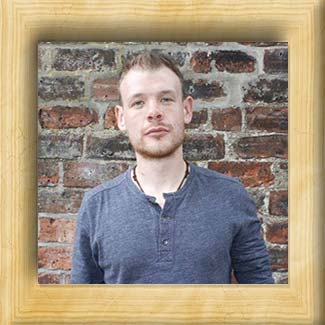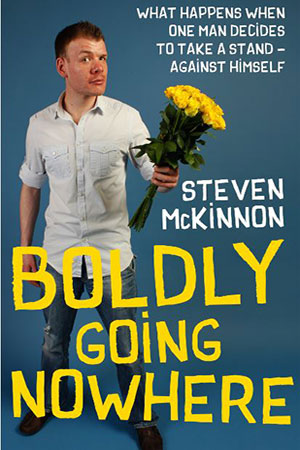Joining me today, and hoping that his knowledge of pop culture might come in useful, or that I’m happy to have Iron Maiden playing in the background, is author Steven McKinnon. Thank you, Steven, for taking the time to chat to me. Please sit down, get comfortable and let’s begin.

About Steven McKinnon
Steven McKinnon is an independent writer, living, eating and just about breathing in Glasgow.
He is the author of ‘Boldly Going Nowhere’, in which he tells the story of how he broke free from the suffocating rut he was in, which involved many instances of embarrassing himself when talking to girls.
When not writing deeply personal stories about his private life and showing them to the world, Steven will either be listening to Iron Maiden or filling his brain with pointless Buffy, Game of Thrones and Battlestar Galactica trivia.
His first published piece of short fiction, ‘GoogleFuture’, appears in Issue 6 of The High Flight, while ‘The Vividarium’ can be found in In Memory: A Tribute to Sir Terry Pratchett.
Steven completed two courses of Creative Writing at the University of Glasgow in 2010, and completed an HNC (Higher National Certificate) in Professional Writing Skills at Reid Kerr College in 2006. He is 30 years old, and was born in the bathroom of a high-rise flat in Glasgow on the 18th of March 1986.
He has since moved out.
What’s the name of the book you’re here to talk about today?
Boldly Going Nowhere

Tell us a bit about your book
How do you convince someone to love you when you can’t love yourself?
Shy, geeky, lonely and running full-speed in the fast lane to nowhere, Steven McKinnon is stuck in a rut. He hates getting out of bed in the morning. He hates being a burden on his friends and family. And he hates himself for letting life slip through his fingers.
‘Sounds like you need a girlfriend,’ says one of his mates one night down the pub. It’s the call to action Steven needs. But what happens when you embark on a journey of self-discovery and don’t like what you find? What happens when you somehow defy the odds and make things worse? And even more terrifying – what do you do when someone actually likes you?
Stopping off in Prague, Gothenburg, Newcastle and the sleepy hills of rural Scotland, Boldly Going Nowhere is the hilarious and achingly honest true story of what happens when one man decides to take a stand – against himself.
How important are character names to you in your books? Is there a special meaning to any of the names?
Well, for my first book, names were very important – as was changing some of them as it’s a real-life story. I wanted to use my real name due to the nature of the story (and image! That’s me on the front cover. Does that mean I can technically say I’m a model?), and use pseudonyms for one or two other real people who popped in and out of it.
For my fiction work, names often come automatically then are changed later on depending on if they ‘fit’. My current work in progress, a fantasy piece, has one character in particular with a name with special meaning, and the rest I just stuck on if I thought they sounded cool. Real world geography came into play with some names, as some locations are analogous to real countries and continents.
Give us an insight into your main character. What makes them unique?
What makes the main character in Boldly Going Nowhere unique is that I am him, and he is me! I guess it’s true that writers infuse all their characters with some part of themselves. In this case, I put in everything. And then some more.
So I suppose the question becomes ‘What makes me unique?’ At the risk of sounding flippant and not a smidgen pompous, nothing that doesn’t make anyone else unique. You could say that ‘uniqueness’ is universal, which is a bit of an oxymoron. I think – and certainly this is what I wanted to put across in Boldly Going Nowhere – we get caught up with the negatives of our lives and don’t often realise that just about everyone else has gone through the same or similar. I wanted to be explicit about that, to show people that it’s okay to talk, that ignoring or bottling problems doesn’t solve them, whether you perceive them as minor or colossal. This was something reinforced during my therapy (I have a form of OCD called Pure O), which came about after the book was written.
It’s bizarre writing about yourself, but probably preferable to other people doing it!
Where do your ideas come from?
Hmm, I don’t think saying ‘my head’ quite answers this question. I don’t get an idea from a single event or experience, or if I do it comes later in drips and drabs and filtered through every other event or experience. Reading a lot helps too (currently reading Retribution Falls by Chris Wooding) and watching a shed-load of movies, TV and playing story-driven computer games.
Actually, the project I’m working on just now has clear influences (to my mind, anyway) of stuff like Firefly, Battlestar Galacitca and some of the Final Fantasy games.
What do you consider to be your best accomplishment?
Having The Vividarium published in an anthology put together in memory of the late, great and wonderful Sir Terry Pratchett was pretty amazing. Probably the most fun I’ve had writing a story too, and all proceeds go to Alzheimer’s Research UK.
I’ve also got into stand-up comedy recently, so standing up and joking about my OCD as a way to confront it was a small personal victory! (You can read a bit about that here https://goo.gl/MeFkbv)
Where do you see yourself in 10 years?
Graduating from ‘going bald’ to ‘been bald for nine and a half years now.’
I might write a sequel and call it ‘Baldly Going Nowhere’…
What writing advice do you have for aspiring authors?
Keep writing. Consistency is the key. Even on ‘off’ days, I allow myself 20 minutes. If it’s like drawing blood from a particularly surly stone and nothing’s coming, I do something else. If it’s going well, then I don’t even notice the time going.
But we have to live our lives too, so getting out there and experiencing and making our own stories is important.
Also, try experimenting between ‘pantsing’ and ‘plotting’ and see what techniques work.
Also also, read.
Do you read reviews of your book(s)? Do you respond to them, good or bad? How do you deal with the bad?
I have done! I actually don’t take the negatives as badly as I thought, which was a surprise. The editor of In Memory: A Tribute for Sir Terry Pratchett wrote a spot-on review of my book. There’s a part of the story, near the end, where I threw all of the real life stuff that was happening into it. I was worried that it was too much, or too boring, but I also recognised that I was too close to it to be objective like I am with my fiction. So, I sent it off to my beta readers and editor, and they didn’t draw much attention to the section. So, I left it as-is, a growing, gnawing uncertainty rising as I read it over again.
This review picked up on it being a little too ‘soap opera’, which I completely agreed with. The silver lining is that I’ve learned to trust my own instincts even when I might biased. (Plus it was a positive review overall, so certainly can’t argue!)
What is your least favourite part of the writing / publishing process?
Hmm… Having too many ideas for my fingers to keep up with.
Is there one subject you would never write about as an author? What is it?
I would put it here, but I can’t write about it.
Is there a certain type of scene that’s harder for you to write than others?
I find them all equally insurmountable. Actually, probably fight scenes, but this is something I want to *cough* combat, so I’m putting loads of fight scenes into my current WiP. Better to confront it than to avoid it!
What are you working on now?
A fantasy, action, adventure piece inspired by the old pulp novels and every TV show, movie and computer game I’ve ever loved! I’m having a lot of fun with it.
Can you give us a few tasty morsels from your work-in-progress?
I’ll put in a list, and hope that whets the appetite without giving anything away:
• Airships
• Sword fights
• Gun fights
• Explosions
• A hint of magic
• Airship battles
• Pirates
• Sky pirates
• A giant snake
• Heroes
• Villains
• Morally-challenged characters
Describe what your ideal writing space looks like.
A quiet room that I can sit alone and un-quiet with Iron Maiden music (which is exactly the case for this interview!)
Why should a potential reader buy your book(s)?
Because it is exactly like whatever their favourite book is, but better.
What’s the strangest thing you have ever had to research for your book?
Nothing too strange, bar the usual writerly habits of looking into serial killers, knife-fighting techniques, swords, murder, the airspeed velocity of an unladen swallow etc.
…I’ve just cleared my browsing history.
What’s something you’re really good at that few people know about?
I can make a Nutella and Ferrero Rocher cake. Also, I can move my nostrils at will. (As far as super powers go, it’s not brilliant.)
What’s an interesting fact about your book?
Everything in it happened, for better or worse! Including the bit at the doctor and revisiting a certain derelict high school that may or may not have been 100% legal…
Also, there might possibly be a hidden short story at the end of it.
Where did your love of books come from?
They’re a constant – everyone should read. I loved picturing the grand battles, castles, car chases, magic, wizards, space ships and every other thing in my head.
What advice would you give to your younger self?
DON’T DRINK FROM THE FOUNTAIN.
He’ll know what I mean.
What would the main character in your book have to say about you?
“Isn’t it weird talking about yourself? At least you’re ridiculously handsome. And delusional.”
Of all the characters you have created, which is your favourite and why?
Hahaha… I’ve been staring at this for a while and cannot think of an answer! Okay, today it’s Ernest the Hairy Goat-Man With a Leopard’s Face (who, by the way, is a hairy goat-man with a leopard’s face).
Who are your favourite authors, and why?
Dave Gorman and Danny Wallace – because their non-fiction hijinx makes me want to be their mate so I can join in on one of their adventures.
Douglas Adams and Terry Pratchett – because their fictional hijinx makes me want to be their mate so I can join in on one of their adventures.
What’s the best thing about being an indie author?
Absolute freedom!
Also, that’s the worst thing.
Where can readers go to discover more about you and your books?
Website | Blog | Facebook | Twitter | Amazon Author Page | YouTube
Available formats: ebook and paperback
41



Be the first to comment!